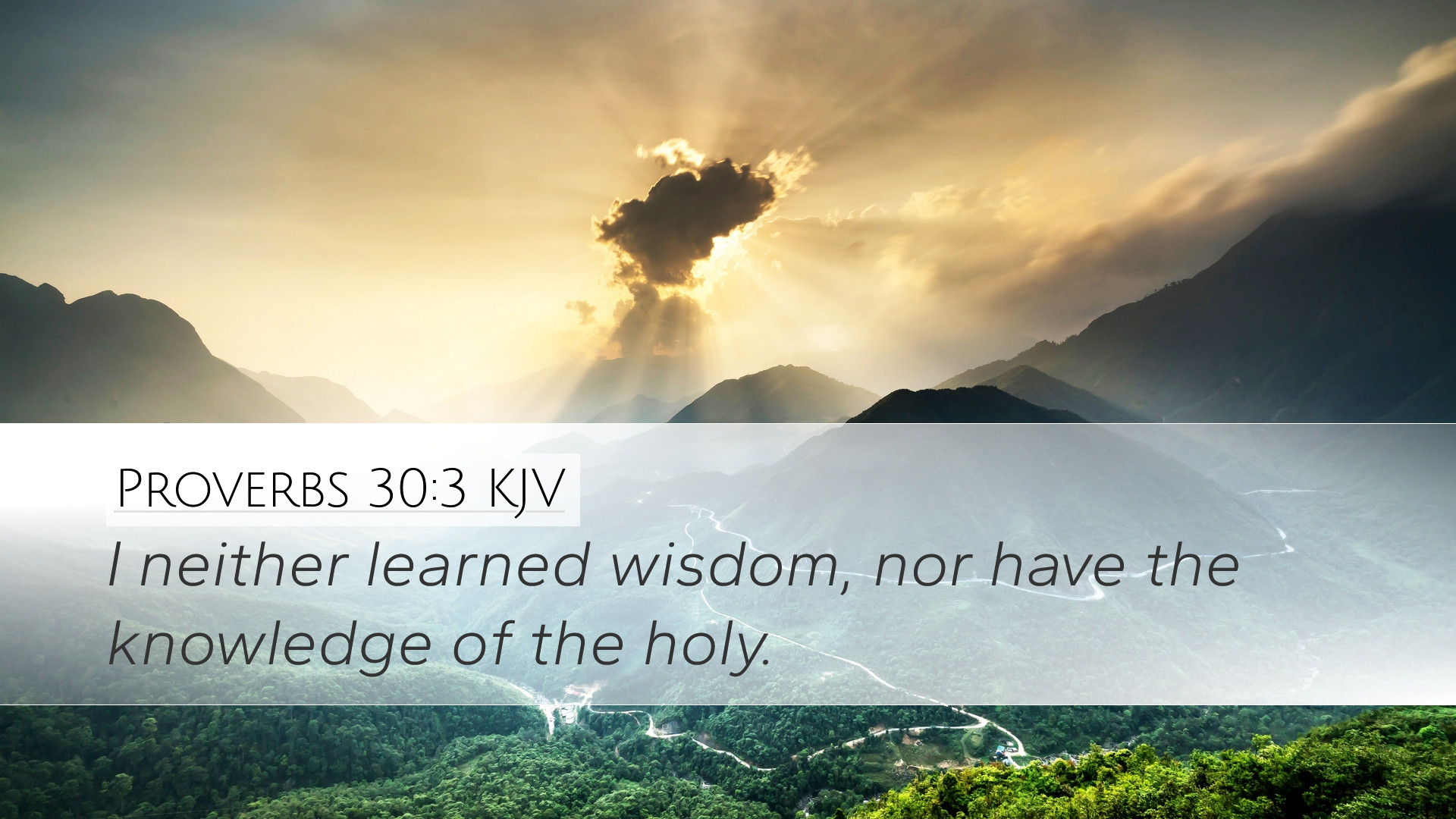Proverbs 30:3 Commentary
Bible Verse: "I have not learned wisdom, nor have I knowledge of the holy." (Proverbs 30:3)
Introduction
This verse, nestled within the context of Agur’s reflections, captures a profound acknowledgment of human limitations in the pursuit of divine wisdom and knowledge.
Agur’s humility and self-awareness serve as a pivotal theme, inviting readers to contemplate the nature of true wisdom in relation to God.
Understanding the Context
The Book of Proverbs is rich with insights and practical wisdom. Proverbs 30 introduces Agur, the son of Jakeh, who emphasizes the importance of understanding one’s own limitations. His discourse leads to reflections on knowledge, the fear of the Lord, and the divine order of creation.
Insights from Matthew Henry
Matthew Henry elucidates the verse by emphasizing Agur's recognition of his ignorance concerning wisdom. He notes that true wisdom begins with an acknowledgment of our own lack:
- Humility in Learning: Agur does not claim to possess wisdom; instead, he confesses his ignorance. This approach resonates with the biblical principle that the fear of the Lord is the beginning of knowledge (Proverbs 1:7).
- Knowledge of the Holy: Henry highlights that true wisdom includes a deep and thorough understanding of who God is, which Agur admits he has not attained. This underscores the importance of divine revelation in the acquisition of knowledge.
Reflections from Albert Barnes
Albert Barnes, in his commentary, expands on the contrast between human wisdom and divine wisdom:
- Limitations of Human Wisdom: Barnes notes that acknowledging one's lack of wisdom is a critical step toward seeking God’s truth. The realization that human understanding is frail and inadequate cultivates a deeper dependency on divine insight.
- The Nature of Divine Knowledge: Barnes emphasizes the significant distinction between intellectual knowledge and spiritual knowledge, which comes only from God. He highlights Agur’s humble prayer-like admission as a pathway to genuine enlightenment.
Commentary by Adam Clarke
Adam Clarke provides a scholarly perspective on the implications of this verse, focusing on its doctrinal significance:
- The Search for Truth: Clarke posits that Agur's declaration reflects the essence of every seeker’s journey. The quest for wisdom inherently involves recognizing that we do not possess all answers.
- Spiritual Enlightenment: Clarke stresses that the knowledge of the Holy involves a relational understanding of God, which goes beyond mere intellectual acknowledgment to include submission and reverence.
Theological Implications
This verse carries weighty theological implications:
- The Nature of Wisdom: The acknowledgment of ignorance encourages believers to seek wisdom earnestly and to rely on God’s guidance above their own understanding.
- Dependency on Divine Revelation: Agur's admission serves as an invitation for believers to lean into God's word, which provides clarity, understanding, and direction.
- The Fear of the Lord: Ultimately, true wisdom and knowledge flow from a reverent relationship with God. Proverbs invites readers to embark on a transformative journey that begins with humility.
Practical Applications
This verse is not merely an ancient reflection but a contemporary challenge for the church today:
- Cultivating Humility: Pastors and leaders are called to model humility, recognizing their own need for continual growth in wisdom and understanding.
- Seeking Divine Knowledge: Congregations should be encouraged to prioritize the study of Scripture and prayer, fostering an environment where the knowledge of God flourishes.
- Embracing Lifelong Learning: The admission of ignorance can unlock opportunities for discipleship and mentorship, creating pathways for deeper relationships among believers.
Conclusion
Proverbs 30:3 encapsulates a timeless truth about the human condition: that wisdom is rooted in the recognition of our limitations. As pastors, theologians, and students of the Word, the challenge remains to continually seek the knowledge of the Holy with humility, acknowledging that true understanding can only be attained through divine revelation. By embracing Agur’s heartfelt honesty, believers are invited on a transformative journey toward greater wisdom, deeper faith, and a greater appreciation for the majesty of God.


